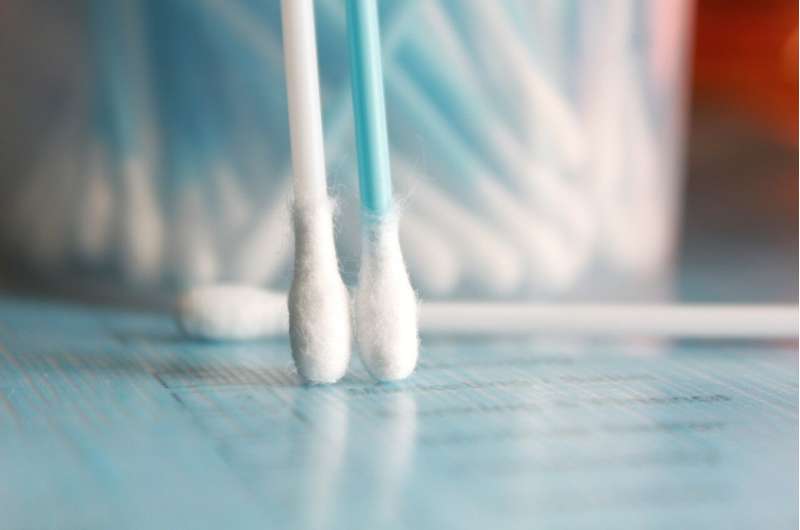Quit removing wax from your ears

It can be a common habit—after a shower or getting out of the pool, grabbing a cotton-tipped swab to clean out one's ears to help get rid of excess water, or to remove what one thinks is earwax build-up.
And while the cotton swab is the most common instrument, surprisingly, people use other everyday items such as combs, hairpins, pens, pencils, straws and toothpicks, to do the job as well.
Not only do cotton swabs—and those other aforementioned instruments—not remove ear wax, but they can pose a risk of hearing loss. Using small items of any kind puts us at an increased risk of puncturing the ear drum, which can cause pain, infection and even long-term hearing loss.
"For a lot of people, the feeling of cleaning the ears can be reassuring or satisfying. Some may never experience any issues for years," said Jason A. Brant, MD, assistant professor of Otorhinolaryngology: Head and Neck Surgery in the Perelman School of Medicine at the University of Pennsylvania. "There are also many people who feel that they need to clean their ears to be healthy and to stay clean, which is not the case."
According to the American Academy of Otolaryngology Head and Neck Surgery Foundation, as long as the ears are functioning properly, people should not be trying to remove ear wax, and should leave it alone.
For the vast majority, ear wax does not cause any problems and there isn't a need to remove it. There are actually benefits to having ear wax including a self-cleaning mechanism and some antimicrobial properties.
"Having ear wax does not mean that the ears are 'dirty,' it is a normal part of how the ear canals function," said Brant. While earwax may seem gross, a certain amount is helpful and can protect and prevent dust or other harmful objects from getting into the ear.
Using cotton swabs and other similar tools does not actually remove ear wax. Instead, these items push ear wax further down into the canal and can even get stuck, which can cause discomfort and potential damage to the eardrum, even after one use.
Ear, nose and throat (ENT) specialists, called otolaryngologists, like Brant treat patients with ear, nose, and throat disorders, and see many patients with ear drum perforations that are most often caused by ear infections or trauma associated with pushing of ear wax.
Brant also warns people to be wary of at-home ear wax removal systems and devices, as they too can end up pushing ear wax deeper, which can cause problems. Some people under a doctor's care may require regular cleanings, but this is not the case for everyone. More damage can be created by trying to clean or remove ear wax versus just leaving it alone.
"The skin in the ear is very thin and even slight trauma from such a device can cause injury," Brant noted.
But if you feel that there is too much water remaining in your ears after a bath or visit to the beach, it's okay to use a towel or wash cloth to wipe the outside of the ears. That should be enough, Brant says. There are some over-the counter drops a doctor or pharmacist can recommend too.
Of course, if one is experiencing pain, hearing loss, or seeing any concerning discharge, they should seek medical attention. A person whose ear wax "appears to be oozing out of the ear, seems to have a flaky or sticky consistency, is bleeding or expelling yellowish-pus, should seek medical attention for further evaluation," Brant says.
For people who have had previous ear infections, tubes, surgery, or any perforation in the ear drum, they'll need medical guidance before putting anything in their ears including over-the-counter drops.


















